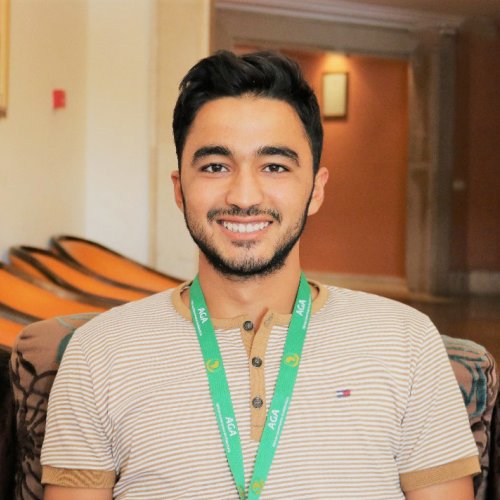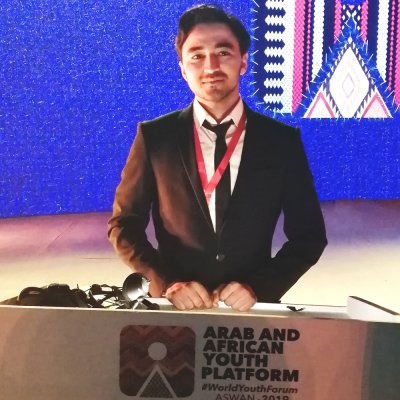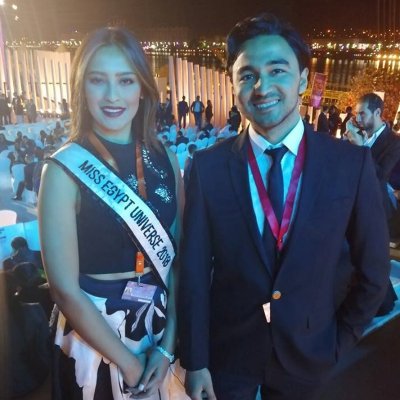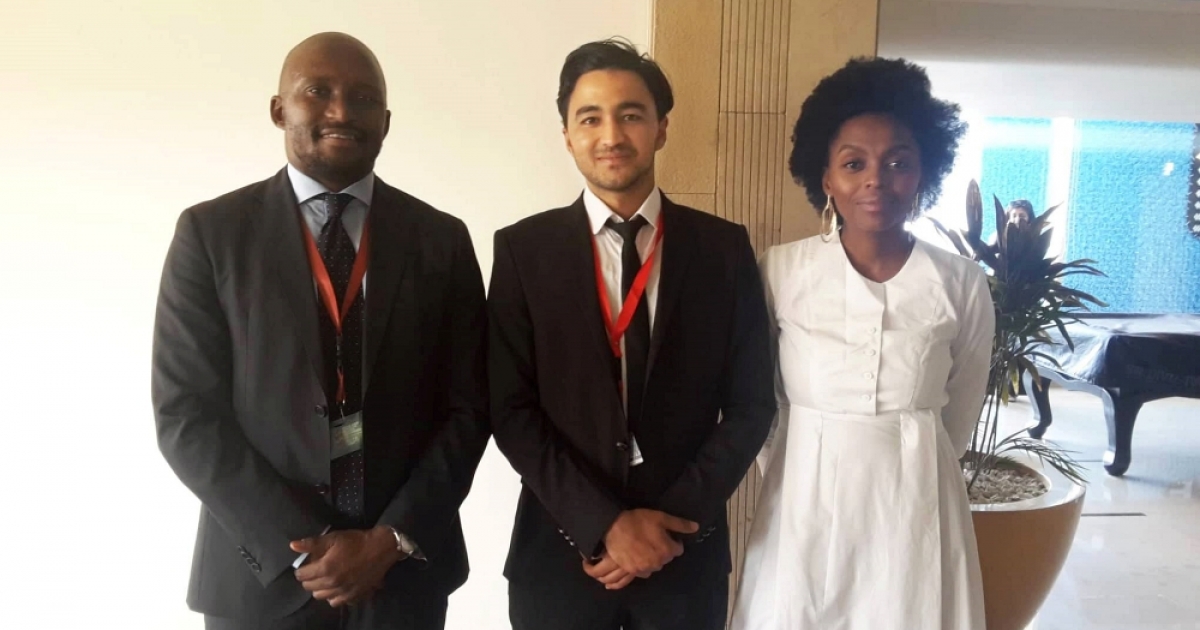“The Hope of a Better World Will Allow the World to Be Better”
Ahmed Aziz, is a 22 years old Tunisian citizen. He is a young entrepreneur and a Master’s student at the Higher School of Commerce in Tunisia (ESCT) majoring entrepreneurship and business administration. He took part in many entrepreneurship initiatives such as M2GATE program in Michigan, SPARK summer school in Egypt and Harvard crossroads program at Dubai. Ahmed Aziz is a reliable, and multitasking person who is full of capabilities and hidden potential. Being driven by a very critical mindset, he ubiquitously innovated in his work.
Q: Tell us a few things about your country, and also your life's story!
A: Tunisia is steeped in history with more than 3000 years of civilization. Going from the Ancient Carthage and Romans, to Fatimides, Ottomans and Amazigh, the region witnessed major civilizations passing by its soil, and it has been a hot spot on the maps due to conflicts over its strategic location and natural resources.
But Tunisia survived, and it continues to survive with all the chaos and conflicts in surrounding countries. During the Tunisian revolution over the old president’s regime, Tunisian youth, men and women proved very high solidarity, compassion and unity. It has become clear that Tunisia is not a place for tyrants nor terror, and it is on the right track for development, prosperity and success.
Just like any other young democracy, Tunisia is still suffering the aftermath of the old regime with all of its busts, flunks and sever recoveries. With a relatively high rate of unemployment and hard socioeconomic conditions, young entrepreneurs started to seek new methods and opportunities to leverage their innovative mindset to improve their socio-professional conditions and push the economy forward. As a Tunisia citizen, I take the metro every day to university. During my 30 minutes journey, I see different people every day, with different glances and face expressions. Mostly, an overwhelming look of a frustrated person, tired of conflicts and hard conditions. But if you look well, you can see it, a glance of persistence, a better future and a commitment to make a better country for future generations.
Q: What is your view of the world as it is today? And how do you define the concept of a better world?
A: What is wrong with the world? Honestly everything! War, famine, poverty and even debt… With that said, perhaps I should avoid the suspicion of this having potentially come from someone who’s adopted a nihilistic outlook. While it would actually make it easier for someone who sees from my perspective, I don’t personally subscribe. I’d say it's not so much people who are to blame or governments at fault as much as it is the following: ignorance (lack of exposure to ideas through culture/education - a truncated frame of reference if you will), ideologies based and then further developed upon this ignorance, decrepit traditional beliefs disassociated from what we better know today, whatever accompanying dogmas (religions and cults), and the surrounding socio-economic-political systems. The last part is key, however, because it is largely what shapes and further determines most everything else.
Yet, I remain convinced that there is a glimmer of hope. Hope is a great white horse; let us hitch it up, sit astride it and never let it go. It is hoped that can one day change the course of things. It is the hope of a better world that will allow the world to be better, and it is within Mankind, right there alongside its vices, that we find all the hope for our future. The past is in the past; let its wisdom and mistakes guide us towards hope and light… a better world for all humanity, where justice prevails. Where “the many” have their voice actually heard.
Some of the major problems that the community is facing are poverty and inequality, foreign debt and corruption. There is an important number of people living in extreme poverty in Tunisia, especially in the interior regions. The civil society has started some initiatives to support these people but it was lacking the government’s interference. Also, we always had the problem of foreign debt, especially after the Tunisian revolution (2011) when the productivity dropped to its minimum.
The government had to turn to international financial institutions and friends to seek loans. But even after 8 years, it is hard to pay off these debts while in the midst of surrounding conflicts and refugees entering from neighbour countries. As for corruption, I believe that this is actually one of the most pressing issues that are hard to handle. It is spread on all levels of society and government. I’m not stating that everyone is corrupt, this is a mere state of the fact that there is a lot of back-scratching happening everywhere, starting from fancy offices to small municipal offices. Other problems such as unemployment and productivity are becoming more and more pressing lately.
Q: As a young individual what are a few of the hurdles that you had to overcome up until today?
A: The hurdles that I have faced are pretty much similar to what many young people face in North African countries. Although these young people make up the majority of society, they are completely excluded from processes of decision-making, even though these very decisions determine their future.
Being conscious about this problem and completely aware that those who are supposed to serve you in upper position, are making decisions -in your name- that conflicts with your own future, is definitely not an easy thing to leave with. The dilemma of agency has been here for a long tie name and it will continue to exist till the end of time, but taking the problem to a level that might affect the future of thousands and even millions, is definitely frustrating.
As a person who is very much active in the Tunisian civil society, I had to deal with the problem of the lack of any clear and promising policies that will help to overcome the issues which trigger emigration, violence and youth exploitation. Not having a clear vision and a governmental strategy to tackle these issues, makes it even harder for civil society entities to sufficiently address them. Eliminating the catalysts of conflict, including those related to economic challenges and the political exclusion of the youth soul definitely be a priority for governments.
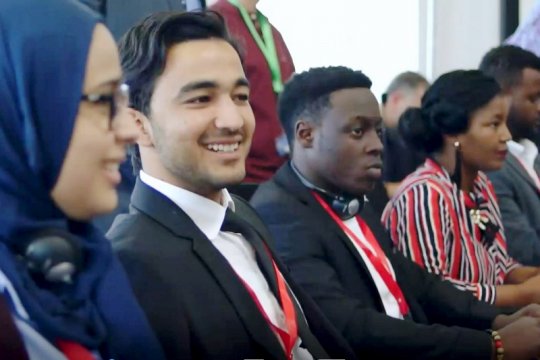
Q: Why is the role of a mentor important for you?
A: As in the Odyssey, a mentor is a teacher, coach, counselor and protector. He/She is someone whom you can build a relationship based on affection and trust with. A mentor is invaluable for so many reasons, but essential for providing knowledge, motivation, advice and counsel, encouragement when need it most, help with personal development and support. As a student in the field of business, my mentor, Mrs Joan Wucher King, has been a valuable source for knowledge and aspirations. Her advice is always very valuable assets to me.
Q: Do you have a lesson that life has taught you and you would like to share?
A: Loyalty is paramount, plain and simple. People know that if you speak badly of others, you’ll speak that way about them sooner or later.
Q: Name a project, a foundation or a person in your country that you think is doing great work in helping improve other people's lives!
A: Afrika Youth Movement
Q: Athena40 is the first ever global selection of the top 40 women forward thinkers, commentators, activists, authors, academics, entrepreneurs, executives, innovators. Can you think of a truly innovative and forward-thinking woman from your country that you wish to nominate for the Athena40 global list?
A: Aya Chebbi (Special Youth Envoy - African Union)
Q: Share with us a phrase, a poem or a story that you love or you find interesting!
A: Is it just me or is the human race, armed with religion and absolutely frantic with hatred and fear, galloping pell-mell back to the dark ages?
Q: Tell us one thing that you have learned from your mentor.
A: No matter how good you are, expect yourself to obey the rules in your first year in a job. Then you can blossom up like a flower.


